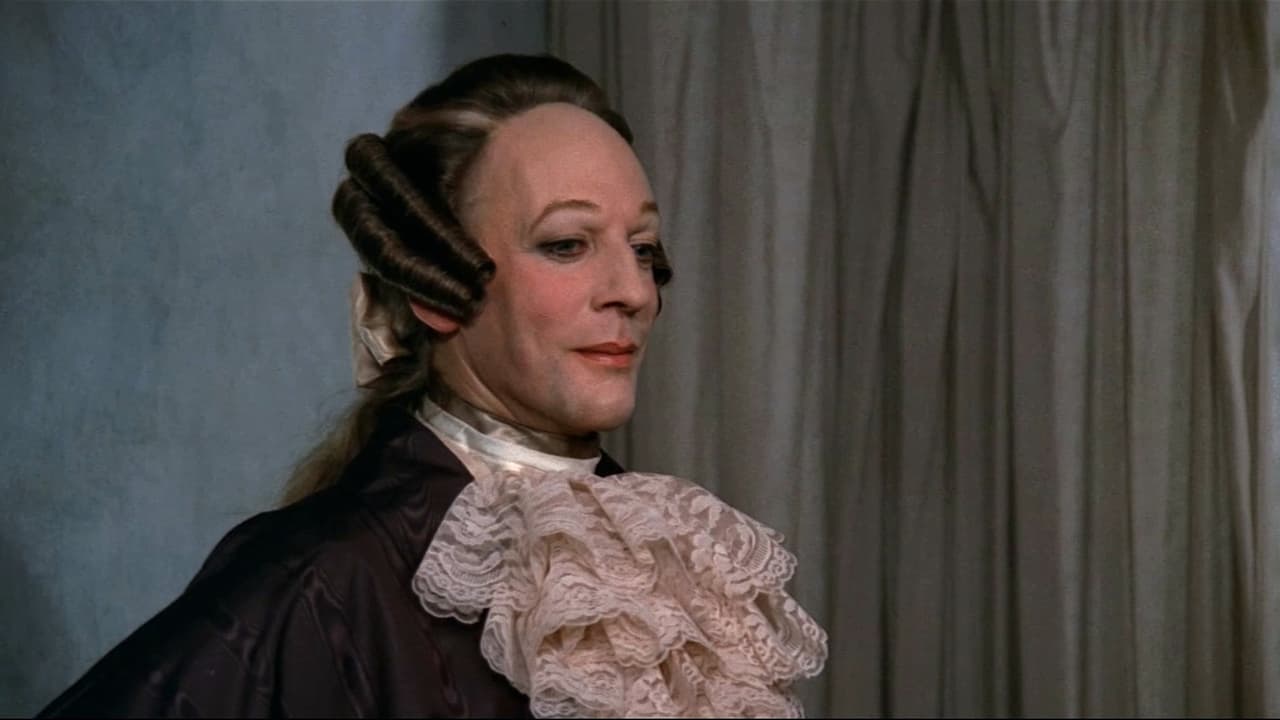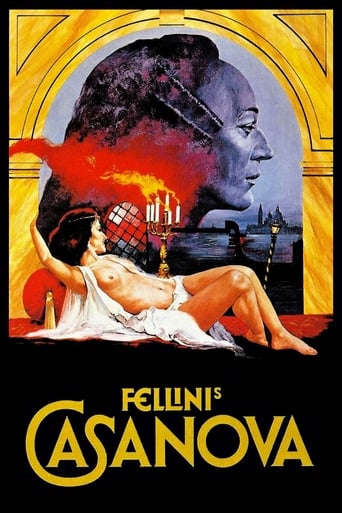

Fellini needs no recommendations. He's the Magician. And Sutherland is one of a few. Plus, he diaries of Casanova are on of the most inspirational literature works of the last centuries. These alone are sufficient. But Casanova of Fellini is something more. As Fellini feels awe (fear and worship at the same time) for women, he degrades men. From Satyricon to the City of Women men appear to surrender, give up their role and the force they once exerted over the other sex. As he deals with the story of his compatriot, Giacomo Casanova, the emblematic womanizer, he lets emerge a tragic figure, a man prisoner of his dubious reputation, a solitary creature that crawls on patios and lounges of prerevolutionary Europe, among degenerated monarchs and nobles who don't understand what is to come and have fun until boredom, The wretched Fellini hero tries to survive sometimes as stallion, sometimes as metaphysical guru and . Trying to ascend socially, he keeps falling, ending his days in a kitchen of a German lord having dinner with the servants who taunt him. He, the greater lover, finally makes love with a doll. (amazing scene). Fellini stays faithful to the text, far away from the beautification of those who grappled with this story, and Sutherland interprets one of the most tragic heroes in the cinema of the 20th century.
... View MoreWhat happens when an extravagant filmmaker makes a movie about an extravagant individual? Well, you obviously reach the height of extravaganza but is there anything obvious with Fellini? It starts with the title: why this juxtaposition of the two men's names? "Fellini Roma" made sense as it was the vision of a city from one of his sons, Fellini, not Visconti, De Sica or Risi. But Giacomo Casanova is a historical figure, a literate adventurer who wrote exhaustive memoirs (of undisputed authenticity) that became remarkable accounts of the 18th century customs whether in court or intercourse, why should Casanova then be linked to Fellini as if he was belonging to him? The reason is actually startling, Fellini didn't like Casanova, he took him as a self-centered pompous aristocrat who disguised his crass appetites under an efficient mask of sophistication so the Casanova we see is the Casanova according to Fellini's vision and Fellini is such a larger-than-life figure that he's entitled to portray whoever he wants however he likes. But this argument doesn't hold up very well because 'Casanova' isn't just a name, it became an adjective defining a womanizer, so when the director who expressed to the fullest his lust for women and life's pleasures, makes a film about Casanova, maybe it's because there's something of Casanova in il Maestro, if he doesn't mind.Indeed, for all his nobility, Casanova is a sex-addict, with a constant craving for the weirdest and most grotesquely unusual performances. Donald Sutherland, with his high stature, his shaven forehead, his false nose and chin and fancy clothes looks like a giant turkey, but within this weird appearance, he stands above his peers, as if his aura elevated him despite himself. He's a complex and paradoxical figure. There's a sort of running-gag where he keeps praising his intellectual and scientific merits, and he was a versatile fellow indeed, but no one ever cares for this aspect. His reputation always precedes him. Am I going too far by thinking that Fellini would share a similar frustration, being constantly associated with his baroque universe made of parties and voluptuousness? A way to show that even the brightest minds embraced sex, as a form of expression? Now, how about women? The film is as full of sexuality as you would expect from a "Casanova" biopic, but there is something deliberately mechanical and playful in the treatment (one of the most passionate encounters is with a doll actually) as if Casanova's sexual appetites were more driven by a disinterested quest for prowess and games than one of the ideal woman. The visit of the belly of the whale could be seen as Freudian symbolism, but I don't think Casanova had such oedipal impulses as he's not even tempted to join the tourists. We all have one mother, but we can have as many women as we want; they can have motherly roles, but that doesn't seem like what Casanova is looking forward to discovering, diversity is the key.And as to illustrate this diversity, the film is built on the picaresque episodic structure where Casanova makes many encounters with every kind of women: young, sensual, depraved, weak, fainting, chanting, pretty, freakish, ugly, the film is very repulsive but appealing in an appalling way. And maybe the greatest trick Fellini ever pulled was to confront men with the hypocrisy of monogamy, as Casanova, the Fellinian, is proved right through one simple thing: pornography. The lust for sex has reached such maturity that men aren't aroused by pretty faces and perfect bodies anymore, the uglier, the older, the dirtier sometimes, the better. Fellini and Casanove reconcile men with their polygamist nature.And this is why I recommend not only the film, but the DVD Bonus Features. In a little documentary made before the shooting, many Italian actors were interviewed about Casanova. Ugo Tognazzi said that in the pre-Revolution period, some dishes were left deliberately rotten in order to have an extra taste or smell, appealing to gourmet tastes. A classic beauty is revered and praised, but that's not what men are looking for. The documentary is followed by a visit to a nightclub and many 'Casanovas' explain their tricks: feigning indifference, being genuinely shy, showing that they care for women, they might not all act like Casanova but they have one thing in common, they know how to create desire, and more than anything, to satisfy it. You just don't earn a womanizing reputation by being impotent. The secret is to be aroused and excited by everything, it's a discipline.The score of Nino Rota has something mechanical about it, or experimental, but it fits the tone because Casanova took sex seriously, like an accomplished athlete looking for self-improvement, so a sensual music couldn't have worked. But I less enjoyed the sex, a bit outdated even if the treatment was deliberate, than the enigma of Casanova, a man who was ahead of his time because he understood, before everyone, one of the main drivers of society, sex and desire, and he expressed it to the fullest, and we somewhat envy him, although the word 'Casanova' has something pejorative about it, but in Italy, the perception is different, it's a part of the Italian psyche, and like Mastroianni said in the documentary, a psyche symbolized in the film's opening with a giant Venus' statue emerging its head in Venice before plunging again, as if it was all a dream.The Venus metaphor seems to indicate some guilt behind the 'Casanova' heritage, there's a little of Casanova in every Italian man, in every men, but maybe that's nothing to be proud of. Anyway, like Macchiavelli, the man became an adjective, something our mind can relate to with more or less shame, it's only fitting that the director who made a movie about him, also inspired an adjective. Indeed, there was something Fellinian about Casanova... so the title sounds a bit like a pleonasm.
... View MoreIt's certainly important to note that Fellini thought that the historical Casanova was a scumbag, a crook even a fascist. In his film, the character appears as a scatterbrained, melancholic, mechanical tragic figure: like a marionette, a Pinocchio who never turned into a human. The story starts in Venice, Casanova's home town, with a Fellinesque carnival scene, where a statue of Venus is pulled out of the canal. This effigy with its protuberant, blue eyes is an equally powerful initial motif like the Christ figure in La dolce vita. And there we have the comparison: both films show similar dreary worlds of vices. Like Marcello, Casanova strays from one orgy to the next, screws around randomly. Donald Sutherland is remarkable, and it is intriguing to look at his unimpressed, incurious, lost soul wandering between the splendid masks and suits of the high society which makes Casanova basically another picaresque tale and like La dolce vita and Satyricon totally excessive in every aspect. And this shows Fellini's strength and weakness. The principal fault is probably the main protagonist himself. Casanova was not only a woman 'eater', but also a literarily educated man, mathematician and politician with knowledge in economy, science and occultism. Just like the French ambassador who watches the screen Casanova copulating, but leaves before he is about to say something, Fellini refuses the opportunity for the historical character to defend itself. The direction on the other hand is, as usual, masterful. What remains is a clinical, highly reserved character study, spectacular, but cheerless.
... View MoreThis is actually my very favorite movie of all time. And that is odd as I distinctly was disappointed with it when I first saw it. But it has grown on me over the years. Don't see this movie thinking you'll have lightweight porn from the Ancien Regime era. This is anti porn; Casanova's amours fill Fellini with disgust and contempt as do his intellectual pretensions. I've read that the entire movie is a condemnation of the Enlightenment which Fellini depicts as a fiasco. Casanova's tireless travels also serve Fellini well as a stage for his Italocentric racism. Every race in Europe is heavily lampooned; Hungarians,the Spanish, the French, the English, and most contemptible of all, the Germans. Distinctions are even drawn clearly between the racial and cultural differences between Venetians and Romans and Savoyards...This is Fellini's last great movie. After this he seemed to get so disgusted with the modern world that he withdrew intellectually; you see this a lot in older men. They turn away then they get out of touch. After Casanova you get City of Women and Fred and Ginger. They're all terrible, very sad to see the decrepitude of a great talent. But in Casanova we can see the great man at the very pinnacle of his powers. And even the the utmost squalour there are great beauties here to admire, for Fellini loves the visual world and expresses it in film with the most original cinematography and the most wonderful stage sets. If you can find it on DVD letterbox format don't miss buying it.
... View More